AVAREF Events
Upcoming and Recent Events
1. AVAREF Assembly
-
The AVAREF Assembly (November, 2021, Virtual Meeting)
The third biennial Assembly of AVAREF is scheduled in November, 2021 through virtual meeting. -
The AVAREF Assembly (October 2019, Victoria Falls, Zimbabwe)
The second biennial Assembly of AVAREF was held in Victoria Falls, Zimbabwe, in October 2019. It brought together the heads of the NRAs or their representatives, and the chairpersons of National Ethics Committees from the African region.
2. AVAREF Steering Committee Meetings
-
AVAREF Steering Committee (24 February, 2021, Virtual Meeting)
Steering Committee Meeting was held on Wednesday 24 February 2021 from 9 am Brazzaville time to discuss and adopt the regulatory pathway for COVID-19 vaccine emergency use authorization. -
Emergency AVAREF Meeting for discussion of EUL of Covid-19 vaccines
Emergency AVAREF meeting was held on 3 December, 11h GMT, 12pm Brazzaville time to present the roadmap for regulatory approvals following WHO EUL and to endorse reconditions for information sharing between EUL participating countries and other regulators of the region. The meeting invitation was extended to invite the chair of AMRH Steering Committee, chairs of heads of NRAs Forums from each of the Regional Economic Communities, and AUDA-NEPAD for alignment for implementation.
Landmark Events of the African Vaccine Regulatory Forum (AVAREF)
The following are some landmark events that have characterized the history and work of AVAREF to date:
1. First AVAREF Meeting and the Birth of AVAREF
October 2006, Accra, Ghana
This first meeting of AVAREF set the stage for the expansion and formalization of the network into its present form. The meeting was attended by regulators and chairs of ethics committees from 20 countries of the WHO African Region: Algeria, Botswana, Burkina Faso, Cameroon, the Democratic Republic of the Congo, Ethiopia, Gabon, Ghana, Kenya, Malawi, Mali, Mozambique, Nigeria, Rwanda, Senegal, South Africa, Tanzania, Uganda, Zambia and Zimbabwe. Several participants of this historic meeting have gone on to become heads of NRAs on the continent. Among them is the current Chair of the AVAREF Steering Committee, Mrs. Mimi Darko, who is now Chief Executive of the Ghana Food and Drug Authority.
2. First AVAREF Joint review: Conjugate Meningitis A Clinical Trial Application
June 2006, Banjul, The Gambia
The first AVAREF joint review was for a clinical trial application of phase II and II-III studies of a conjugate meningitis A vaccine, produced by the Serum Institute of India. The clinical trial was sponsored by PATH/MVP (Meningitis Vaccine Project). The two target countries for the clinical trial were Mali and The Gambia. Both countries had participated in a workshop in Addis Ababa, Ethiopia, in September 2005 which resulted in the development of regulatory procedures for submission and review of clinical trial applications, and for the importation and release of clinical batches. These model procedures were used to inform the sponsor on the documentation required by the NRAs. Participants of the joint review meeting were the NRAs and Ethics Committees of Mali and The Gambia, as well as representatives from other countries (Senegal, Ghana, Ethiopia and Burkina Faso) where clinical trials were planned for the future. Independent experts were recruited by WHO to support the processes of review and inspection. Representatives from the countries that participated in this joint review reported to WHO to have successfully applied the knowledge and methodology to other clinical trial applications. A second joint review of a clinical trial application for the same conjugate meningitis A vaccine was done in Dakar, Senegal, in June 2007.
3. First AVAREF Joint GCP Inspection
January 2007, Mali
The first joint inspection of a clinical trial site took place in Mali in January 2007 with participants of the first joint review for the conjugate meningitis A vaccine (The Gambia, Senegal, Ghana, Ethiopia and Burkina Faso). Independent experts were recruited by WHO to support the inspection processes. Participating NRAs and ECs reported several benefits of this first joint inspection, including capacity building, enhanced knowledge, and clarification of their roles and responsibilities. This joint GCP inspection contributed towards harmonization of procedures, which was consistent with WHO GCP standards and which would further contribute to quality of research and the reinforcement of protections for the research participants.
4. First AVAREF Joint Review of Phase III Malaria Vaccine CTA – RTS,S/AS01
October 2007, Zanzibar, Tanzania
Following the two joint reviews of clinical trial applications for conjugate meningitis A vaccine (Banjul, The Gambia, in June 2006 and Dakar, Senegal, in June 2007) AVAREF convened a Joint Review meeting of the RTS,S/AS01 malaria vaccine. The seven countries targeted for the joint review, and which had earlier received the clinical trial application from GSK, were Burkina Faso, Gabon, Ghana, Kenya, Malawi, Mozambique and Tanzania. The sponsors were represented by GSK Bio (Belgium), PATH (USA) and Principal Investigators (PIs) from all the countries.
In the joint review meeting, an initial presentation outlining the product was made by GSK Bio, followed by questions and answers by ethics committees and NRAs of the target countries. Next, there were queries raised by the countries, which were addressed by the sponsor and investigator team. The meeting ended with an endorsement of an agreement for GSK Bio to submit amendments to the protocol and to address local needs of the countries. In addition, the countries would review the amendments and documents required and, when satisfied all requirements had been met, would proceed to provide their decisions to GSK individually. The terms of reference for the formalization of AVAREF were also discussed during this meeting.
5. AVAREF Annual Meeting
September 2009, Abuja, Nigeria
At the 2009 AVAREF annual meeting in Abuja, Nigeria, GSK presented the 6-month follow-up efficacy data for RTS,S – which had just been reported, showing an efficacy of 80%. Also discussed at the meeting were the recent SAGE recommendations about rotavirus and pneumococcal conjugate vaccines.
6. AVAREF Annual Meeting
October 2010, Nairobi, Kenya
At AVAREF’s annual meeting in Nairobi, Kenya, discussions began for Health Canada to host what would later become its annual Regulatory Forums in Ottawa, Canada. At the same meeting, Health Canada initiated discussions with the PPB of Malawi to start a mentorship program which would help Malawi to systematically put in place systems to improve regulatory work. The Nairobi meeting was attended by Health Canada, WHO HQ and WHO AFRO.
7. AVAREF Annual Meeting
September 2011, Maputo, Mozambique
The annual meeting was opened by the Minister of Health of Mozambique. The meeting was used to organize a joint review of a clinical trial application for a TB vaccine for five countries, submitted by AERAS TB.
8. AVAREF Annual Meeting
October 2012, Libreville, Gabon
The meeting was opened by the Minister of Health of Gabon. The country has well-known clinical trial sites engaged in the clinical trial of RTS,S. Meeting participants visited the clinical trial site at Lamberene, one of the sites for the phase III clinical trial of RTS,S. For the first time, an AVAREF meeting had a session on vaccine safety facilitated by WHO HQ.
9. AVAREF Annual Meeting
October 2013, Entebbe, Uganda
The meeting was hosted in part by the Uganda National Drug Authority, who treated participants to an evening of culture and dinner in Kampala. Helen Byomire-Ndajige represented Uganda in the meeting.
10. AVAREF Annual Meeting and AVAREF Emergency Meeting for Ebola Virus Disease
November 2014, Pretoria, South Africa
Between 2014 and 2015, joint reviews were focused on expediting CTAs for Ebola interventions, due to the outbreak of Ebola Virus Disease (EVD) in West Africa. As part of AVAREF’s response to the EVD epidemic, two days of the five-day annual meeting were repurposed to address the epidemic. This meeting proved to be crucial in accelerating product development against EVD. Due to travel restrictions, the U.S. FDA and EMA could not travel to the meeting in Pretoria, South Africa. However, the three leading developers of vaccines against EVD attended the meeting, and presented their candidate vaccines, plans for clinical trials and target countries. The designs of the planned clinical trials were discussed, and the ethics committees and regulators provided very useful advice to the developers, facilitating the advance of their candidates into clinical trials later. The AVAREF members agreed on critical recommendations which would later define product development in emergencies and eventually inform the current emergency joint review. These key recommendations were published in WHO Drug Information.
11. Extraordinary Meeting and Formalization of AVAREF
June 2016, Addis Ababa, Ethiopia
In 2016, AVAREF’s scope expanded to cover all medical products, rather than just vaccines. An extraordinary meeting of AVAREF was held in Addis Ababa, Ethiopia, in June 2016 to formally endorse a new governance model and to elect members of the governing bodies of the network. The joint secretariat of AUDA-NEPAD, WHO HQ and WHO AFRO facilitated this landmark meeting.
The meeting assembled all heads of NRAs and chairs of national ethics committees on the continent. For the first time, North African countries (Algeria, Tunisia, Morocco and Egypt) that are also members of the WHO Eastern Mediterranean Region (EMRO), participated and were represented in an AVAREF meeting. Participants of the meeting unanimously endorsed the new governance model for AVAREF, elected a chair of the AVAREF Steering Committee (SC) and members from all the Regional Economic Communities (EAC, SADC, OCEAC, ECOWAS and IGAD) to serve on the first AVAREF SC. Similarly, a new Technical Coordinating Committee (TCC), also representing the RECs, was endorsed. Hudu Mogtari, then Chief Executive of the Ghana FDA, was elected as Chair of the SC.
As the strategic and policy decision-making body, the SC would develop the key guidelines and documents required by AVAREF through its TCC and Working Groups, and would review and present them to the Assembly for endorsement and domestication. This meeting marked as the start of a new era for AVAREF, endorsed by all the countries of the African Region.
12. First AVAREF Assembly; AVAREF Tabletop Exercise on Regulatory Preparedness for Public Health Emergencies
November-December 2017, Accra, Ghana
In November 2017, the first AVAREF Assembly was held in Accra, Ghana, bringing AVAREF back to its birthplace. The 2017 AVAREF Assembly was held following the meeting of all the NRAs of the African Region and the Regulators Scientific Conference. During this historic AVAREF Assembly, Member States adopted a maximum timeline of 60 working days for processing and clearance of clinical trial applications. In light of their different capabilities for assessing clinical trial applications, Member States were urged to consistently meet the 60-day deadline.
An AVAREF Tabletop Exercise on regulatory preparedness for public health emergencies was conducted on 26 November 2017, as a satellite session preceding the NEPAD Scientific Conference and the African Medicines Regulatory Conference. The tabletop exercise, organized by WHO and NEPAD with the support from CEPI and other partners, brought together the NRAs and ECs of countries directly affected by the Ebola crisis, representatives from other countries that either supported the AVAREF process or faced similar challenges, and vaccine sponsors. The exercise allowed participants to test the process from a practical perspective, with a view to further inform the process and amend as necessary.
13. First AVAREF Joint Review of the European Medicines Agency (EMA) Article 58 Scientific Opinion of Malaria Vaccine RTS,S (MOSQUIRIX)
February 2018, Mombasa, Kenya
A joint review by the National Regulatory Authorities (NRAs) of Ghana, Kenya and Malawi (the three targeted countries for the RTS,S vaccine pilot implementation programme) was held following discussions in two planning meetings held in Zanzibar, Tanzania in February 2017 and in Addis Ababa, Ethiopia, in June 2017. The EMA had issued a positive scientific opinion on the first ever malaria vaccine to go through its Article 58 review process, and AVAREF responded by supporting the regulators of Ghana, Kenya and Malawi to undertake a joint review of the reports of the European regulators, and to approve the vaccine for use in a pilot implementation: the Malaria Vaccine Implementation Programme (MVIP). This historic joint assessment and approval of the RTS,S vaccine concluded the development of this vaccine, whose clinical trial application was jointly reviewed by seven countries at an AVAREF meeting in October 2007.
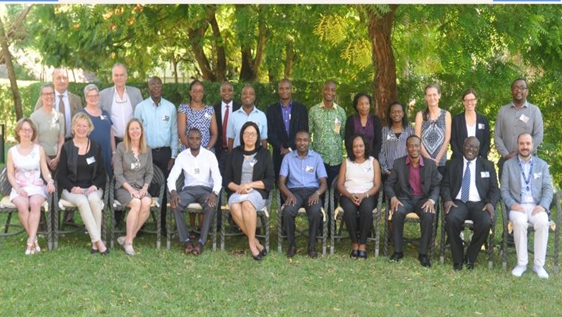
14. AVAREF Annual Meeting
September 2018, Entebbe, Uganda
The annual AVAREF meeting took place in Entebbe, Uganda, on the shores of Lake Victoria.
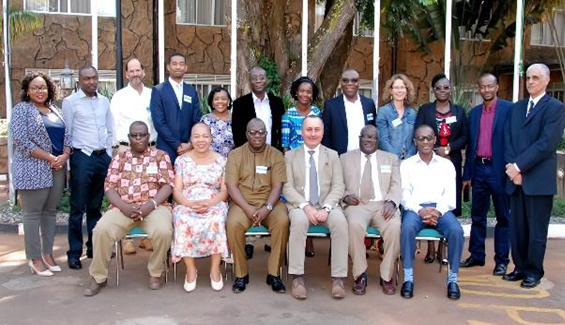
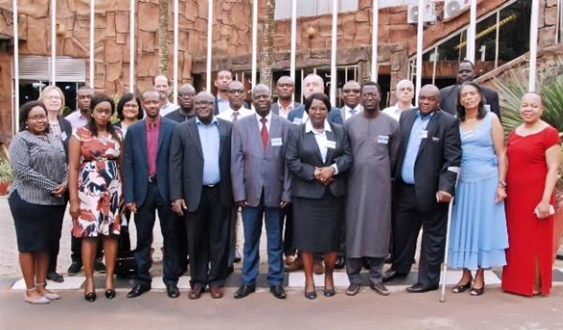
15. Approval of Malaria Vaccine (RTS,S) by Ghana, Kenya and Malawi After First AVAREF Joint Review
2019
In 2019, Ghana, Kenya and Malawi – having undertaken a joint review organized by AVAREF and involving regulators of the EMA in 2018 – separately gave their approvals for the first malaria vaccine. It was a historic year for AVAREF, as the product had started with an AVAREF organized joint review of a clinical trial application submitted to seven countries in 2007, and which eventually culminated in an approval of the vaccine by three of those countries.
16. 6th Annual AVAREF Statutory Meeting of Governing Bodies, the TCC and SC, and Workshop on Domestication of the AVAREF guidelines and tools for ECOWAS Countries
February 2019, Addis Abba, Ethiopia
To promote use of the AVAREF tools and guides by NRAs, a domestication workshop was organized for member countries of the Economic Community of West African States (ECOWAS) on adapting the AVAREF guidelines and other regulatory tools to their respective context. During the workshop, the AVAREF clinical trial application review and approval process was carefully explained, and the AVAREF regulatory tools, including guides and templates for submission, assessment and inspection of clinical trials, were presented. Representatives of Member States and the WAHO Expert Working Group on clinical trials and pharmacovigilance made recommendations for improvement and harmonization of these tools. It was also agreed that an ECOWAS plan to encourage work-sharing and joint activities between countries and the REC, as well as closer collaboration between WAHO and AVAREF, was needed to achieve the objectives set.
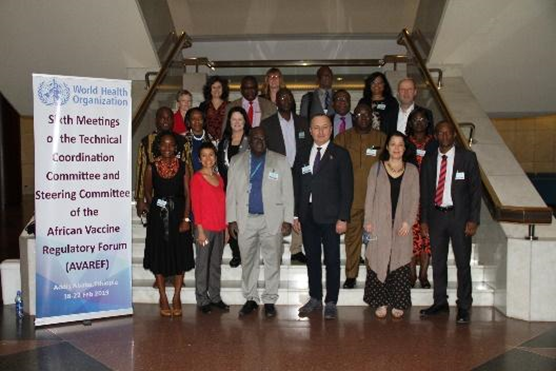
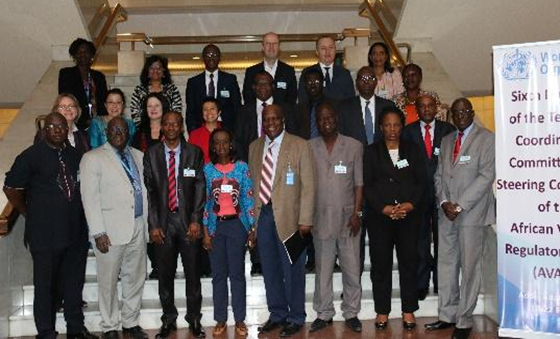
17. AVAREF Workshop on domestication of the AVAREF guidelines and tools for SADC and EAC Countries
20–22 May 2019 in Johannesburg, South Africa
Similar to what had been done in the ECOWAS countries, to promote use of the AVAREF tools and Guides by NRAs, domestication workshops were organized for SADC and EAC countries. AVAREF workshops for Southern African Development Community and East African Community member countries took place in Johannesburg in May to support member countries for adapting the AVAREF regulatory tools and processes for clinical trial application review and oversight activities to their national context. The views and opinions on adopting AVAREF clinical trials tools and processes were shared by representatives from Member States of both economic communities.
18. GCP Inspection Guide for Clinical Trial and Checklist Piloted
June 2019, Addis Ababa, Ethiopia
The AVAREF Good Clinical Practices Inspection Guide and accompanying checklist were adopted by the Steering Committee and piloted at a clinical trial site in Gondar, Ethiopia, in June 2019. The clinical inspection was jointly done with inspectors and experts from Kenya, Sudan and Uganda, as well as WHO. The clinical trial application was reviewed and approved through the AVAREF joint review by the regulatory authorities and ethics committees of Ethiopia, Kenya, Sudan and Uganda. The inspection was carried out to test the AVAREF Good Clinical Practices Inspection Guide and checklist while promoting a joint inspection as part of harmonization efforts. Guidance was developed for inspectorates to conduct inspections of a clinical trial at any stage. It is expected that the inspection guide and the checklist will further help national regulatory authorities improve the harmonization of inspection of clinical trials in Africa.
19. Statutory Meeting of Governing Bodies, the TCC and SC Meeting
22–26 July 2019 in Brazzaville, Congo
Endorsement of revised Joint Review Guidelines by AVAREF SC and TCC was granted. The main purpose for the meetings was to provide updates of AVAREF activities for the members of both Committees and to finalize and adopt AVAREF regulatory tools and initiatives. The participants discussed the use of an online platform to report clinical trial application review timelines for countries participating in the AVAREF joint reviews. They also discussed the adoption of the AVAREF clinical trial regulatory templates for African country information as well as the revised AVAREF joint and assisted review guideline and annexes. The future implementation plan on how to integrate AVAREF with the African Medicines Regulatory Harmonization as one of the pan-African technical working groups
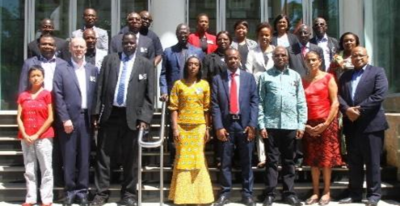
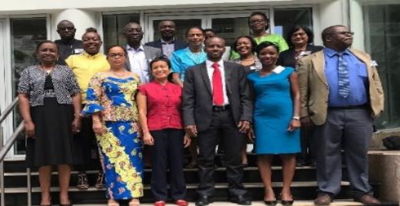
20. Second AVAREF Assembly
October 2019, Victoria Falls, Zimbabwe
The second biennial Assembly of AVAREF was held in Victoria Falls, Zimbabwe, in October 2019. It brought together the heads of the NRAs or their representatives, and the chairpersons of National Ethics Committees from the African region. The Assembly was also attended by key stakeholders from the AUDA-NEPAD, and various partners including the Bill & Melinda Gates Foundation, U.S. FDA, CEPI, EDCTP, the Paul-Ehrlich-Institut (PEI) and the World Bank. WHO was represented by staff members from HQ and AFRO, and a National Professional Officer of the WHO Country Office in Zimbabwe. In light and in fulfillment of the 2016 AVAREF Terms of Reference, this second AVAREF Assembly was held as part of the African Medicines Regulators Conference (AMRC). The AVAREF Assembly, which is the highest decision-making body of AVAREF, endorsed several important documents, approved and ratified proposed new changes to the current AVAREF governance structure and Terms of Reference, and unanimously endorsed a plan for the alignment of AVAREF with the AMRH Programme including a new governance structure, roles and responsibilities. Discussions on the alignment strategies and plans of AVAREF with the proposals of the AMRH on Continental Technical Working Groups (CTWGs) were initiated at this meeting. In the new governance structure and Terms of Reference, AVAREF would now become one of the CTWGs of the AMRH Steering Committee and coordinate its activities with the AMRH Partnership Platform (AMRH PP) as an AMRH Joint Secretariat consisting of AUDA-NEPAD and WHO representatives.
21. COVID-19 Pandemic: AVAREF Develops a Strategy and Guide for Emergency Response
May 2020
In 2020, the beginning of the year saw the outbreak of a coronavirus infection, which would later be declared a pandemic by WHO, having spread to all continents. Between March and May 2020, the AVAREF Technical and Steering committees, supported by the AVAREF Secretariat, developed what was to be a critical strategy and guidance document, making possible the organized conduct of a monumental emergency joint review in subsequent weeks. In response to the pandemic, AVAREF developed an Emergency Action Plan to address COVID-19 through accelerated product development. Based on the 2017 tabletop exercise using MERS-CoV as an example to test the readiness of AVAREF to address clinical trials in the face of an epidemic or pandemic, a strategy and guide was developed to expedite reviews and clearance of clinical trial applications, and to provide oversight to ensure efficient and informative trials. The network introduced and approved an emergency clinical trial review process for COVID-19 interventions which aimed at reducing CTA review timelines to 10-15 days (10 days for the review and decision on clinical trials of products already registered and 15 days for novel products).
22. First Virtual Multi-Sponsor/ Multi-Country Emergency Joint Review
July 2020
AVAREF organized the first ever virtual multi-country and multi-sponsor joint review meeting for 12 countries and several sponsors under the coordination of the Drugs for Neglected Diseases Initiative (DNDi). The pre-submission and monumental emergency joint review meetings were held virtually and enabled the Ethics Committees (ECs), Institutional Review Boards (IRBs) and NRAs to review the proposal in meetings with the sponsors. The use of an electronic platform provided by WHO made it possible for reviewers to post queries and to receive responses from the sponsors and investigators in a timely manner.
23. AVAREF Develops a Compassionate Use Guide
September 2020
The need for a common guide for countries to implement compassionate use to address the needs of patients who require products under experimental evaluation was raised in a previous statutory meeting of the AVAREF Steering Committee (SC). As a result, the Secretariat, with support from WHO HQ, worked with the Technical Coordination Committee (TCC) to develop a compassionate use guide. The document was reviewed by the TCC at two of its sittings and finalized for review and endorsement by the SC. This guide will assist the NRAs to make decisions on compassionate use based on clear standardized principles and international standards.


